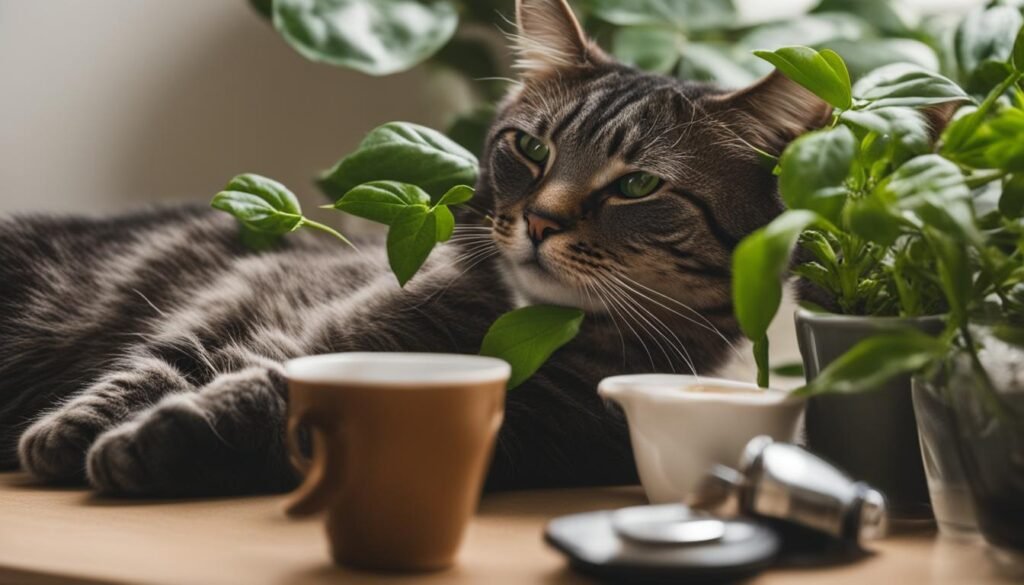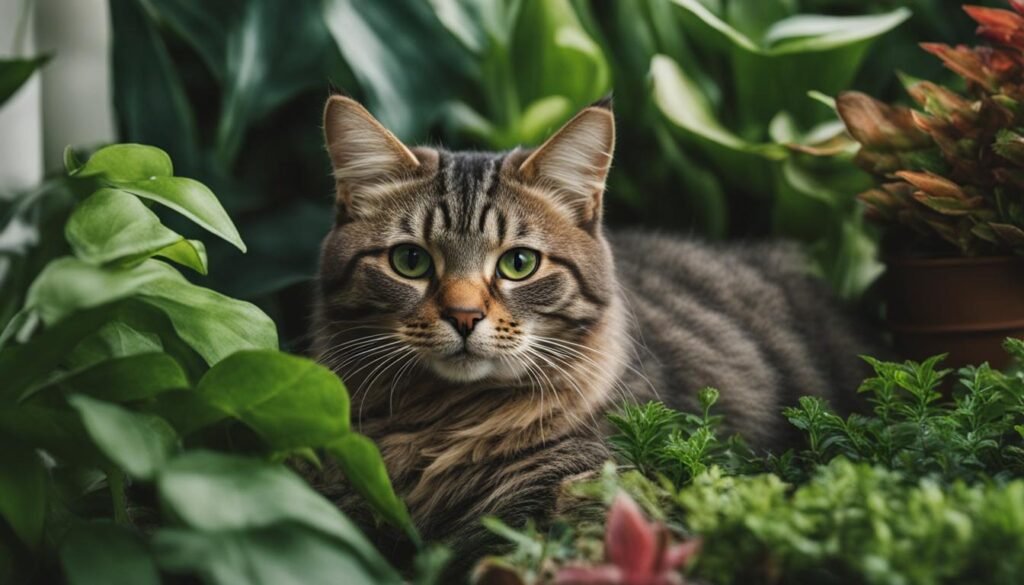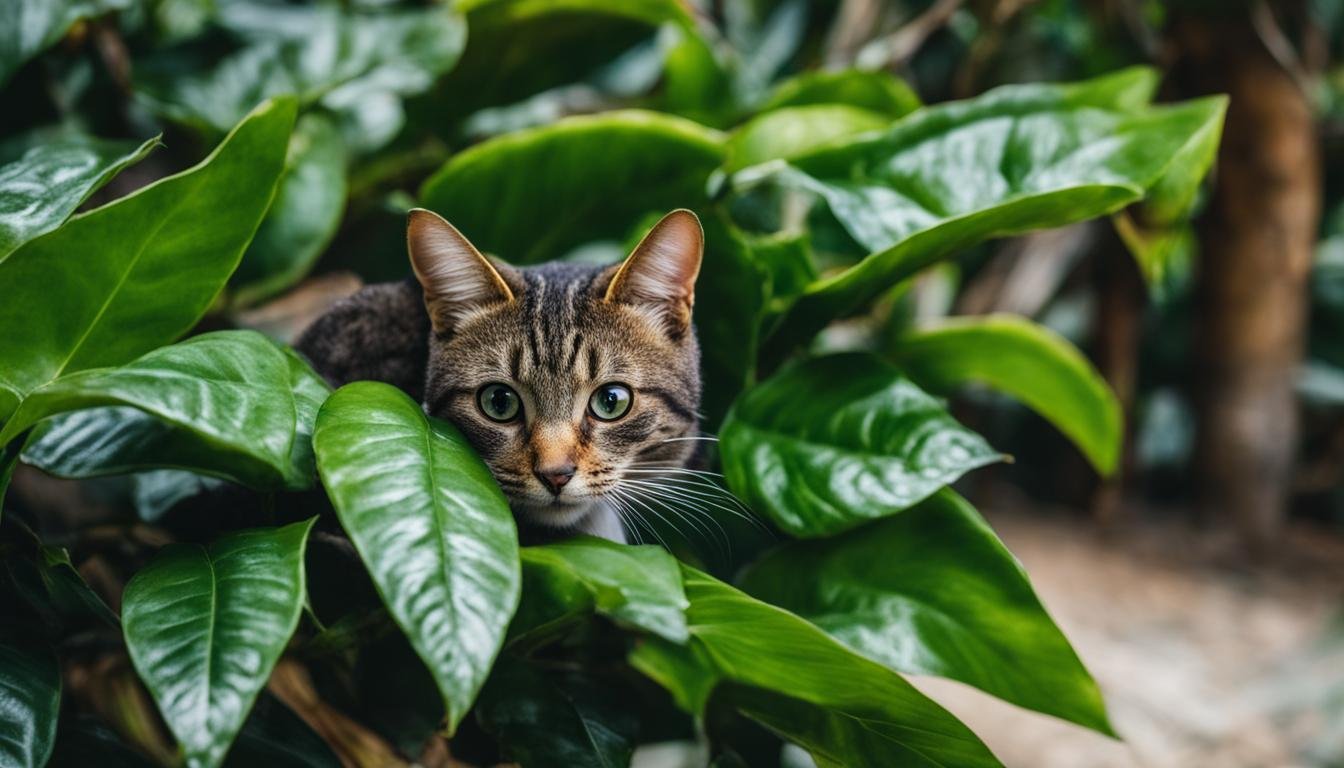As cat owners, we always strive to provide a safe and healthy environment for our furry friends. However, there are many things in our homes that may pose a threat to their well-being, and it’s important to be aware of these potential dangers, including the toxicity of coffee plants.
Coffee plants, with their lush green leaves and enticing aroma, may seem harmless, but they contain toxic substances that can be harmful to our beloved feline companions. If a cat ingests or comes into contact with coffee plant leaves, it can lead to various health issues.
The toxic properties of coffee plants can be attributed to saponins, which are substances that can cause irritation to a cat’s skin and gastrointestinal tract. This means that even a small nibble or rubbing against the plant can expose your cat to potential harm.
Common symptoms of coffee plant poisoning in cats include contact dermatitis, vomiting, loss of appetite, depression, fatigue, and increased heart rate. While it’s rare for coffee plant poisoning to be fatal, it’s crucial to seek immediate veterinary treatment to eliminate the toxins from your cat’s body.
When it comes to our cats’ safety, prevention is key. By creating a cat-friendly environment and being mindful of the plants we bring into our homes, we can help ensure the well-being of our feline friends.
Key Takeaways:
- Coffee plants contain saponins, which are toxic to cats and can cause skin irritation and gastrointestinal issues when ingested or touched.
- Symptoms of coffee plant poisoning in cats include contact dermatitis, vomiting, loss of appetite, depression, fatigue, and increased heart rate.
- Caffeine in coffee plants can be particularly harmful to cats, and even small amounts can lead to serious health issues.
- Immediate veterinary treatment is necessary if you suspect your cat has ingested coffee plant leaves or shows signs of caffeine toxicity.
- To create a cat-safe environment, avoid having toxic plants like coffee plants in your home and store coffee products out of reach of your cat.
Understanding the Risks of Coffee Plants and Cats
When it comes to the health of our feline friends, it’s important to be aware of the potential dangers lurking in our homes. Coffee plants, while beloved for their lush foliage and tall height, can pose risks to our cats. These plants contain saponins, which are chemicals that can irritate a cat’s skin and digestive system if ingested. Additionally, coffee plants contain caffeine, a substance that cats cannot efficiently metabolize.
So, what does this mean for our furry companions? Ingesting even small amounts of caffeine can have serious consequences for cats. It can lead to hyperactivity, rapid breathing, tremors, vomiting, diarrhea, and increased heart rate. If you suspect that your cat has come into contact with a coffee plant or is showing signs of caffeine toxicity, it’s crucial to seek immediate veterinary assistance. Time is of the essence when it comes to treating coffee plant poisoning in cats.
The Importance of Prompt Veterinary Care
- Coffee plants can cause contact dermatitis in cats, leading to skin irritation and discomfort.
- Ingesting coffee plants can result in gastrointestinal issues such as vomiting and diarrhea.
- Exposure to caffeine can cause hyperactivity and an increased heart rate in cats.
- Veterinary treatment may include inducing vomiting, administering activated charcoal, and providing intravenous fluid therapy.
It’s crucial for cat owners to be proactive in keeping their beloved pets safe. One of the best ways to do this is by creating a cat-friendly environment that doesn’t include toxic plants like coffee plants. Store coffee products and plants out of reach from curious kitties. Instead, opt for non-toxic plant alternatives, such as spider plants, Boston ferns, areca palms, catnip, and cat grass, which can provide a safe and enriching environment for your cat.
Symptoms of Coffee Plant Poisoning in Cats

Cats that come into contact with coffee plants or ingest parts of the plant may exhibit various symptoms of coffee plant poisoning. These symptoms can vary depending on the amount of exposure and ingestion. It is crucial to be aware of these signs to identify and address coffee plant toxicity in cats promptly.
Common symptoms of coffee plant poisoning include:
- Contact dermatitis: Cats may develop skin irritations, redness, itching, or rash after coming into contact with coffee plants.
- Depression and fatigue: Affected cats may show signs of lethargy, decreased activity levels, or overall loss of interest.
- Loss of appetite: Cats may experience a decreased desire to eat or a complete refusal to eat.
- Vomiting: Some cats may vomit, which can be a result of ingesting coffee plant material.
- Weakness and tremors: Cats may exhibit muscle weakness or tremors, often seen in their limbs.
- Seizures: In severe cases, coffee plant poisoning can lead to seizures or convulsions.
If you notice any of these symptoms in your cat and suspect coffee plant poisoning, it is crucial to seek veterinary attention immediately. Remember, early intervention can help prevent further complications and provide the necessary treatment for your cat’s well-being.
Diagnosis and Treatment
Diagnosing coffee plant poisoning in cats typically involves assessing the symptoms and history of exposure. There is no specific test for this type of poisoning. If ingestion is confirmed or suspected, your veterinarian may induce vomiting or administer activated charcoal to absorb the toxins in the gastrointestinal tract.
Treatment for coffee plant poisoning in cats often involves supportive care and reducing the absorption and effects of toxins. Intravenous fluid therapy may be given to flush out the toxins and support kidney function. Additional treatments may be provided based on the severity of symptoms and the individual cat’s condition.
It is essential to consult with a veterinarian for an accurate diagnosis and to ensure the appropriate treatment is given to your cat.
Diagnosis and Treatment of Coffee Plant Poisoning in Cats

Coffee plant poisoning in cats can be a serious concern, and prompt diagnosis and treatment are essential for their well-being. While there is no specific test for coffee plant poisoning, veterinarians rely on a combination of symptoms and exposure history to make a diagnosis.
If you suspect your cat has ingested a significant amount of a coffee plant, inducing vomiting may be recommended to remove the toxins from their system. Additionally, activated charcoal is often administered to absorb any remaining toxins in the gastrointestinal tract. Intravenous fluid therapy may be necessary to support kidney function and aid in flushing out the toxins.
Treatment options for coffee plant poisoning in cats may include:
- Administering activated charcoal to absorb toxins in the gastrointestinal tract
- Providing intravenous fluid therapy to support kidney function and flush out toxins
- Administering medications to address specific symptoms, such as antiemetics for vomiting or anticonvulsants for seizures
The specific treatment plan will depend on the severity of the symptoms and the individual cat’s condition. It’s important to consult with a veterinarian for a proper diagnosis and tailored treatment approach.
Cat-Friendly Environment: Protecting Your Feline Friend from Toxic Plants

Creating a cat-friendly environment is crucial to ensure the safety and well-being of your feline friend. One important aspect is to be aware of and prevent access to toxic plants that can harm your cat. By taking a few simple steps, you can create a space that is both aesthetically pleasing and safe for your beloved pet.
1. Choose Cat-Safe Plants
When selecting plants for your home, opt for cat-safe alternatives that won’t pose a risk to your furry companion. Some popular choices include spider plants, Boston ferns, areca palms, catnip, and cat grass. These plants not only add a touch of green to your living space but also provide your cat with safe and enjoyable stimulation.
2. Keep Toxic Plants Out of Reach
Preventing access to toxic plants is essential. Coffee plants, in particular, contain substances that can be harmful to cats. Ensure that coffee plants or their products are stored in areas that are inaccessible to your cat. Consider placing them in high or closed cabinets, or keeping them on shelves that are securely mounted to the wall.
3. Regularly Monitor Your Cat’s Behavior and Health
It’s important to stay observant of any behavioral or health changes in your cat. Keep an eye out for symptoms such as vomiting, diarrhea, or a decrease in appetite, as these may indicate exposure to toxic substances. If you notice any concerning signs, consult your veterinarian promptly for guidance and assistance.
By creating a cat-friendly environment, you can ensure that your furry friend stays safe and healthy. Choosing cat-safe plants, keeping toxic plants out of reach, and monitoring your cat’s behavior and health are simple yet effective measures to protect them from the potential dangers of toxic plants. Remember, your cat’s well-being is in your hands, so let’s make our homes a haven for our beloved feline companions.
Conclusion
As we wrap up our discussion on the relationship between coffee plants and cats, it is crucial to remember that these plants can pose a significant risk to our feline friends. The toxins found in coffee plants, such as saponins and caffeine, can lead to irritation and potentially serious health issues if ingested by cats.
If you suspect that your cat has been exposed to coffee plants or is displaying signs of caffeine toxicity, prompt veterinary attention is essential. Look out for symptoms like vomiting, rapid breathing, tremors, and increased heart rate, as these could indicate a potential problem.
To ensure the safety of our beloved companions, it is important to create a cat-friendly environment. This involves avoiding the presence of toxic plants like coffee trees in our homes and keeping coffee products securely stored and out of our cat’s reach.
Instead, consider non-toxic plant alternatives, such as spider plants, Boston ferns, areca palms, catnip, and cat grass, which can provide a safer and more enjoyable environment for our furry friends. Additionally, regular monitoring of your cat’s behavior and health is key to early detection of any concerning changes, allowing for timely intervention.
FAQ
Are coffee plants toxic to cats?
Yes, coffee plants are toxic to cats. They contain saponins and caffeine, which can irritate a cat’s skin and digestive system and cause serious health issues if ingested.
What are the symptoms of coffee plant poisoning in cats?
The symptoms of coffee plant poisoning in cats include contact dermatitis, vomiting, loss of appetite, depression, fatigue, increased heart rate, and in severe cases, seizures and tremors.
How is coffee plant poisoning in cats diagnosed and treated?
Coffee plant poisoning in cats is diagnosed based on symptoms and exposure history. If ingestion is suspected, inducing vomiting may be recommended. Treatment often involves administering activated charcoal to absorb toxins and intravenous fluid therapy to flush out the toxins.
How can I keep my cat safe from coffee plants?
To keep your cat safe, it is important to create a cat-friendly environment by avoiding toxic plants like coffee plants. Store coffee products out of reach and consider non-toxic plant alternatives such as spider plants, Boston ferns, areca palms, catnip, and cat grass.
What should I do if I suspect my cat has been exposed to coffee plants or shows signs of caffeine toxicity?
If you suspect your cat has been exposed to coffee plants or shows signs of caffeine toxicity, immediate veterinary attention is necessary. Contact your veterinarian for guidance and follow their recommendations.

Leave a Reply